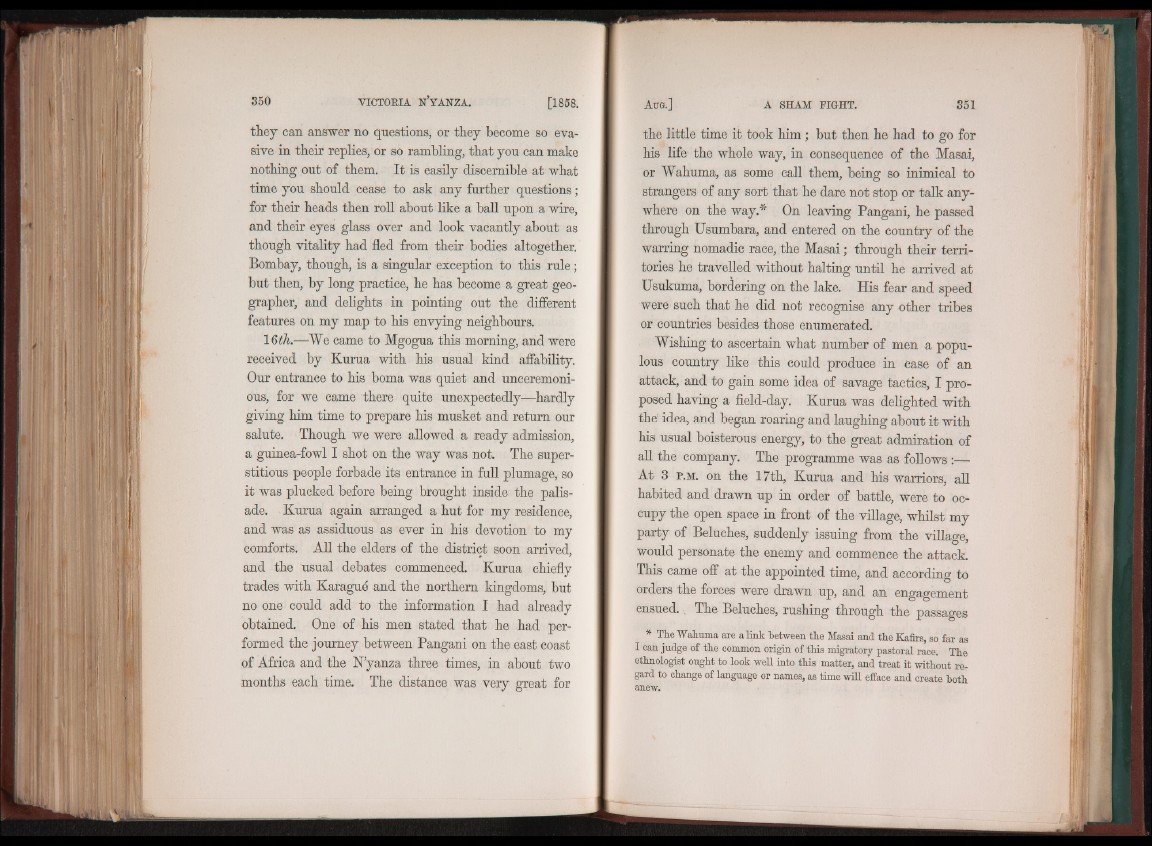
they can answer no questions, or they become so evasive
in their replies, or so rambling, that you can make
nothing out of them. I t is easily discernible at what
time you should cease to ask any further questions ;
for their heads then roll about like a ball upon a wire,
and their eyes glass over and look vacantly about as
though vitality had fled from their bodies altogether.
Bombay, though, is a singular exception to this rule ;
but then, by long practice, he has become a great geographer,
and delights in pointing out the different
features on my map to his envying neighbours.
16 th.—We came to Mgogua this morning, and were
received by Kurua with his usual kind affability.
Our entrance to his boma was quiet and unceremonious,
for we came there quite unexpectedly—hardly
giving him time to prepare his musket and return our
salute. Though we were allowed a ready admission,
a guinea-fowl I shot on the way was not. The superstitious
people forbade its entrance in full plumage, so
it was plucked before being brought inside the palisade.
Kurua again arranged a hut for my residence,
and was as assiduous as ever in his devotion to my
comforts. All the elders of the district soon arrived,
and the usual debates commenced. Kurua chiefly
trades with Karagué and the northern kingdoms, but
no one could add to the information I had already
obtained. One of his men stated that he had performed
the journey between Pangani on the east coast
of Africa and the bPyanza three times, in about two
months each time. The distance was very great for
the little time it took h im ; but then he had to go for
his life the whole way, in consequence of the Masai,
or Wahuma, as some call them, being so inimical to
strangers of any sort that he dare not stop or talk anywhere
on the way.* On leaving Pangani, he passed
through Usumbara, and entered on the country of the
warring nomadic race, the Masai; through their territories
he travelled without halting until he arrived at
Usukuma, bordering on the lake. His fear and speed
were such that he did not recognise any other tribes
or countries besides those enumerated.
Wishing to ascertain what number of men a populous
country like this could produce in case of an
attack, and to gain some idea of savage tactics, I proposed
having a field-day. Kurua was delighted with
the' idea, and began roaring and laughing about it with
his usual boisterous energy, to the great admiration of
all the company. The programme was as follows :—
At 3 p .m. on the 17th, Kurua and his warriors, all
habited and drawn up in order of battle, were to occupy
the open space in front of the village, whilst my
party of Beluches, suddenly issuing from the village,
would personate the enemy and commence the attack.
This came off at the appointed time, and according to
orders the forces were drawn up, and an engagement
ensued.. The Beluches, rushing through the passages
* The Wahuma are a link between the Masai and the Kafirs, so far as
I can judge of the common origin of this migratory pastoral race. The
ethnologist ought to look well into this matter, and treat it without regard
to change of language or names, as time will efface and create both
anew.